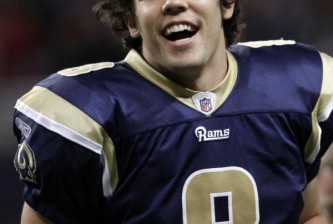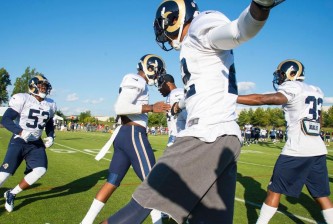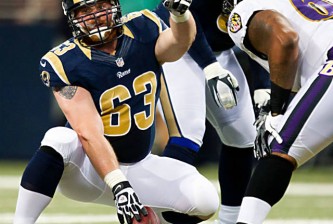But for Mike Jones, Steve McNair is a Super Bowl champion
We’re in the slowest period of the NFL calendar right now, when the only movement on the news wires tends to be announcements of low-level draft pick signings. Beat writers scrabble for fluff pieces and can usually turn a cautiously optimistic coach’s quote into a 1000-word feature. Unless Brett Favre decides to stage another one-man show, there just isn’t much to talk about.
So when news hit of the shooting of Steve McNair, it has spread like balled lightning on a western plain, casting an eerie light on everything. And from the outset of the story’s development, it became clear that this was not a sports story, not an NFL story, but a human story. The story of a person whose life had taken a sudden, tragic turn.
I was listening to some drive-time sports talk yesterday, listening to D’Marco Farr speculate on the shooting, and the evolving circumstances in his life as a newly retired player. Recent estrangement from his wife. A new girl half his age. A prototypical “midlife crisis” – except it ended with a bullet.
The thing that struck me about the story is that, during his career, you couldn’t have asked for a better player to have in the locker room than Steve McNair. He personnified determination and leadership in the quarterback position. Tennessee Titans owner Bud Adams eulogized him as “one of the finest players to play for our organization and one of the most beloved players by our fans.”
As Steve Spagnuolo came into the Rams head coaching job, he opened discourse about the team by talking not about gameplans, but a strategy for rebuilding the personality of the team.
During his playing career, you couldn’t ask for a stronger example of this mythical standard than McNair.
He fought against the dual stigma of being a Division 1-AA quarterback, and a black quarterback. When he was drafted in 1995, the NFL was pre-Rooney Rule, and still had a widespread (but veiled) belief that white dudes had to be the braintrust of your team, your head coaches, your coordinators, your quarterbacks. There were less than a handful of successful black QBs — Warren Moon, Doug Williams, and Randall Cunningham, most prominently — to point to and say different. McNair campaigned gallantly, never bitterly, and finally earned the starting job in 1997. By 1999, he led them to their only Super Bowl appearance. (Coincidentally, 1999’s draft featured three black quarterbacks drafted in the first round: Donovan McNabb, Akili Smith, and Daunte Culpepper. The door had been opened.)
And that Super Bowl — an epic game. The Titans were a ferocious opponent for the Rams on that season’s last Sunday, and McNair very nearly stole the game away with a goal-line pass in the game’s closing seconds.
I think it’s fair to say that McNair set a new standard, and that his play over the course of his career helped make the term “black quarterback” obsolete. He was a great quarterback, period. No other qualifiers were necessary.
And yet, improbably for this “pillar” of NFL citizenship, this gruesome (and salacious) end to life.
What does this, in turn, say about Spagnuolo and his quest for a team based on the Four Pillars? Maybe only that you can only know a man, a future teammate or even the guy next to you in the locker room, up to a point. No matter how they interview, or what their past looks like, you can’t predict the future. You can’t stop a man from being human, no matter how good he seems.






















